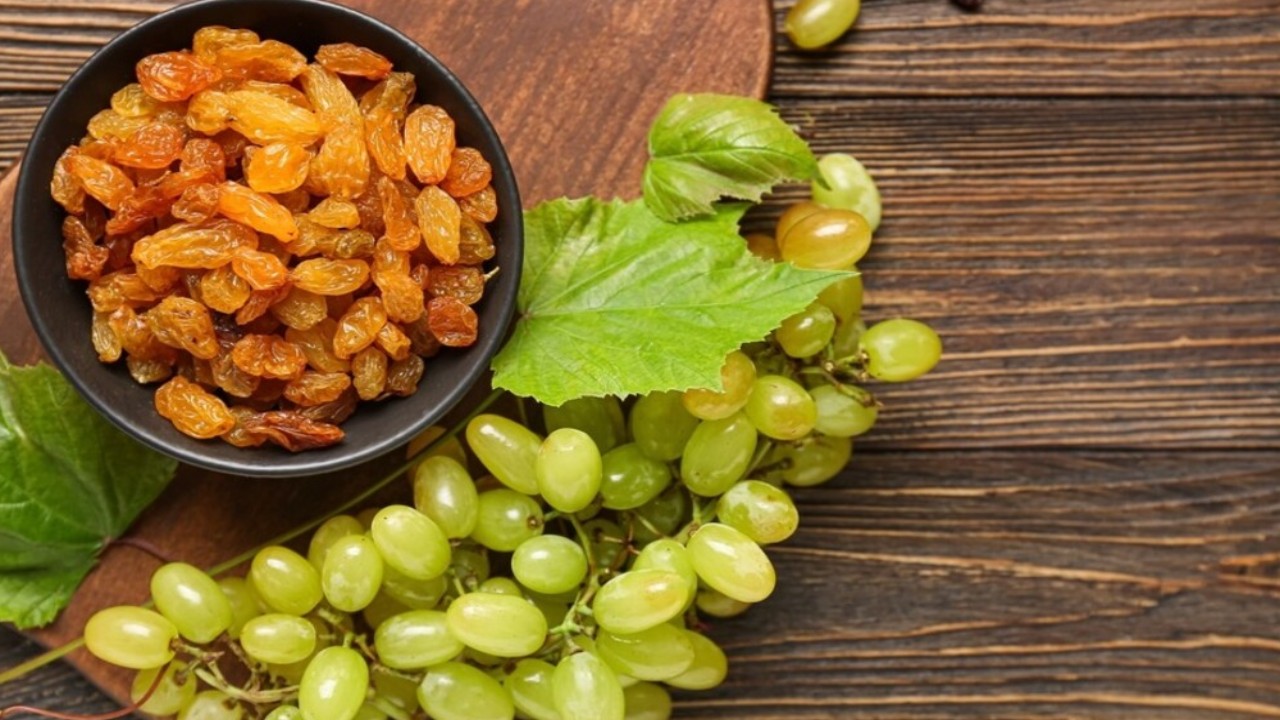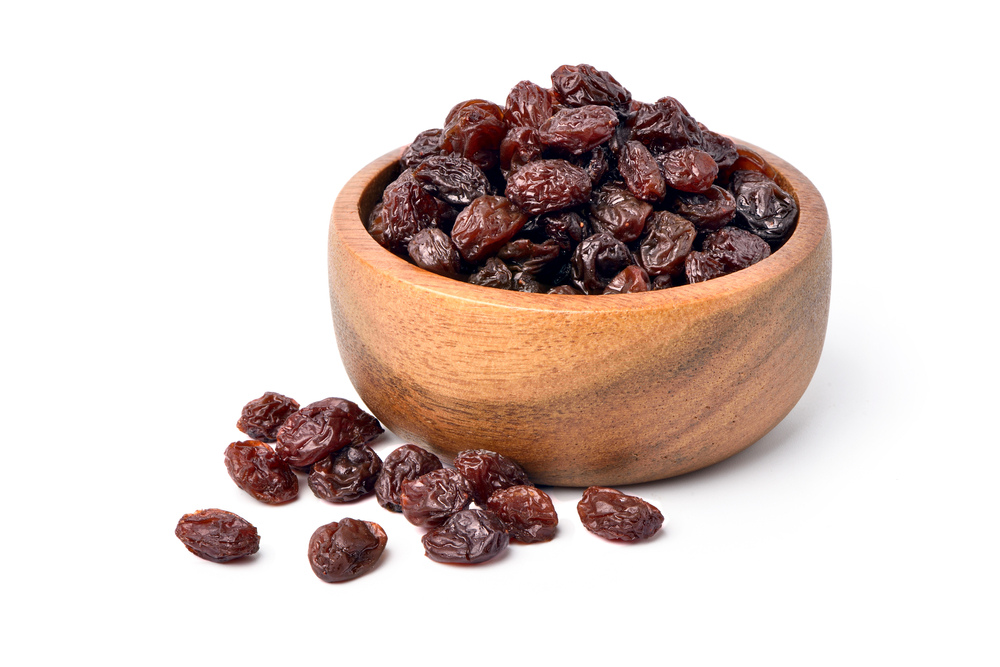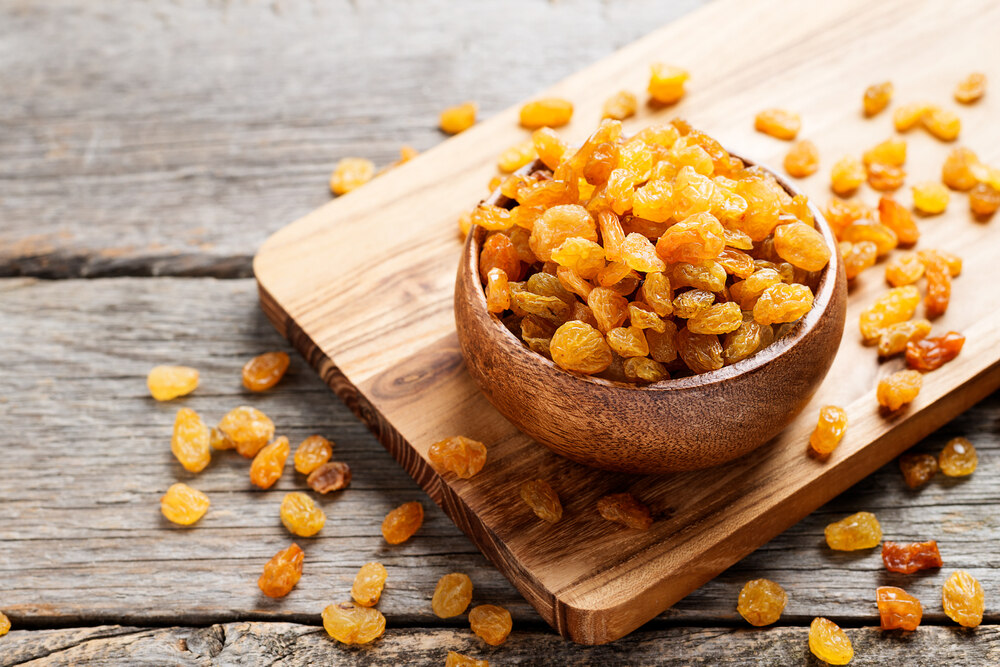9 Amazing Benefits of Raisins to Supercharge Your Wellbeing
Discover the benefits of raisins and find out how this tiny sweet snack can enhance your health with its pack of essential nutrients and potent antioxidants.

What Are Raisins?
Raisins are the dried forms of grapes that are produced by natural sun drying or artificial dehydration which causes the grapes to shrivel. Therefore, these nutrient-packed, high-caloric forms taste sweet, have a chewy texture, and appear shrunk, wrinkled, and darker than fresh grapes. Drying also intensifies the taste as the sugars and nutrients get concentrated. Originating in the Middle East and later gaining immense popularity all over the world, raisins were used as a form of currency in the olden days. They have also found their place in age-old medicines such as for the treatment of food poisoning.
Our reviewer Dr. Allen Conrad, Doctor of Chiropractic and Owner of Montgomery County Chiropractic Center, says, “Raisins don’t directly help with food poisoning, but they can help with an upset stomach. They contain tartaric acid, which can calm the digestive system. They are also a great source of fiber, which can aid in digestion.”
Over the years, the versatility of raisin usage increased as it is now commonly used in baking, cooking, or just a quick healthy snack. There are many varieties of raisins available in the market that vary only slightly in their nutrient contents. Some of the most common ones are Black raisins, currants, sultanas, red or flame raisins, dark raisins, green raisins, and golden raisins.
Nutritional Value of Raisins
Raisins are rich in natural sugars, fiber, vitamins, and minerals which offers many benefits to this tiny food. Although there are wide varieties of raisins available, their nutritional value mostly remains the same. Therefore, let us consider the nutritional value of a quarter-cup of standard raisins (1):
- Calories: 120
- Protein: 1 gram
- Fat: 0 grams
- Carbohydrates: 32 grams
- Fiber: 2 grams
- Sugar: 26 grams
- Calcium: 25 milligram
- Iron: 1 milligram
Additionally, they’re also good sources of
- Potassium
- Copper
- Vitamin B6
- Manganese
- Boron
- Vitamin C

Health Benefits of Raisins
After analyzing the incredible bundle of nutrients present in raisins, let us now understand how these nutrients help enhance your health and wellness. So, here are some benefits of raisins that make them a perfect solution for your sweet tooth:
- May Control Hypertension: Hypertension is a metabolic disease that occurs due to high blood pressure and high LDL or bad cholesterol. Research shows that consuming raisins has helped keep blood pressure in check. Scientists believe the dietary fiber and potassium are responsible for controlling blood pressure by lowering cholesterol levels which when high may accumulate within the blood vessels and increase blood pressure. Moreover, polyphenols are known to reduce inflammation which altogether helps in preventing hypertension. Therefore, moderate consumption of raisins may help prevent chronic hypertensive disease in people since they are a good source of potassium, fibers as well as polyphenols(2).
- Promotes Gut Health: One serving of raisins contains 2 grams of fiber, both soluble and insoluble. The dietary fiber content promotes digestive health by adding bulk to the stool and aiding regular bowel movements. This can be especially beneficial for preventing constipation and maintaining a healthy digestive system. Furthermore, the soluble fibers help in maintaining a healthy gut by offering a desirable environment for the gut bacteria to flourish. This will further enhance acidity regulation, immunity, healthy colon functions, improved digestion and neutralize toxins keeping the gut and overall body healthy (2).
- Excellent Source of Antioxidants: Raisins are known to contain a wide array of beneficial antioxidants such as quercetin, catechins, and flavonoids. These compounds help neutralize reactive oxygen species in the body that are responsible for inducing oxidative stress, degenerative diseases, and inflammation. Antioxidant properties can protect skin cells from free radical damage, lower the risk of metabolic diseases, prevent rapid aging, and offer other potential benefits to our bodies. Therefore the antioxidant compounds of raisins contribute to overall cellular health and may play a role in preventing chronic diseases (2).
- Averts Anaemia: Raisins are a good source of iron, a crucial mineral for the formation of hemoglobin in red blood cells. This molecule is key for the red blood cells to carry oxygen to the cells. Therefore, sufficient iron content indirectly regulates the oxygen transfer to the cells which is necessary to carry out normal metabolic functions, thus preventing fatigue and an iron deficiency disease called anemia. Including raisins in your diet can be particularly beneficial for individuals with increased iron needs, such as pregnant women or those with iron deficiency concerns (2).
- Boosts Bone Health: Several animal studies have shown that rats with osteoporosis have restored bone loss after consuming whole foods like dried plums (DP), figs, dates, raisins, or blueberries. This is due to the presence of minerals like calcium and boron in raisins that support bone health. Adequate calcium intake is essential for maintaining strong bones and preventing conditions like osteoporosis. Boron, another mineral found in raisins, may also contribute to bone health. Therefore, long-term consumption of raisins may help prevent age-related bone health concerns as one-quarter serving of raisins contains over 25 milligrams of calcium (2).
- Preserves Cardiovascular Health: The most common cardiovascular risk factors are unhealthy lifestyles and genetics of the person. Therefore, one aspect of lifestyle is the diet which plays an important role in preventing heart diseases. Therefore, adding heart health-boosting foods like raisins is essential. Raisins contain potassium, a mineral that plays a key role in regulating blood pressure. The fiber and phytochemical content in raisins can help lower cholesterol levels, reducing the risk of heart disease (2).
- Improves Dental Health: Although raisins stick to your teeth and contain high sugar concentration, they may have some beneficial impact on your dental health. Compounds found in raisins, such as oleanolic acid, and other phytochemicals may help suppress the growth of oral bacteria presenting effective antimicrobial properties. While raisins themselves are sticky they do not adhere to teeth for too long. Therefore, unlike traditional beliefs, raisins have potential benefits to oral health which may be realized when combined with good dental hygiene practices (2).
- Helps in Weight Management: Raisins can be a satisfying and filling snack due to their fiber and natural sugar content. They also are nutrient-dense, containing a variety of essential vitamins and minerals. There have been studies that have stated a positive correlation between raisin consumption and plasma leptin concentrations which is responsible for inducing the feeling of fullness. Therefore, including moderate servings of raisins in your diet may help with weight management by curbing hunger, and providing essential nutrients. Their particularly high natural sugars additionally provide loads of energy quickly, making them a convenient and tasty addition to your weight loss diet (2).
- Post-exercise Recovery: The natural sugar in raisins, including glucose and fructose, provides a quick and easily digestible source of energy. This makes raisins an ideal snack for a rapid energy boost, especially during physical activities or as post-exercise snacks. Consuming raisins after physical activity helps replenish glycogen stores and provides necessary nutrients for recovery (2).
How to Eat Raisins
Raisins do not have any strong smell and usually impart a sweet taste, thus making it a versatile and easy-to-use ingredient in any food that needs a dash of sweetness. Here are some ways in which you can enjoy and reap the benefits of raisins – a small nutrient bomb:
- As a Snack: Enjoy a handful of raisins as a quick and convenient snack between meals.
- Trail Mix: Mix raisins with nuts, seeds, and perhaps a few chocolate chips for a delicious trail mix.
- Cereal or Oatmeal Topping: Sprinkle raisins on your morning cereal or oatmeal to add natural sweetness and texture.
- Yogurt Mix-in: Mix raisins into your yogurt for added sweetness and chewiness.
- Baked Goods: Add raisins to your favorite baked goods, such as cookies, muffins, or bread, for extra flavor and texture.
- Salads: Toss raisins into salads for a burst of sweetness. They pair well with leafy greens, nuts, and vinaigrette dressings.
- Rice Dishes: Include raisins in rice dishes, such as pilaf or biryani, for a touch of sweetness and texture.
- Smoothie Ingredient: Blend raisins into your smoothies for a natural sweetener and added nutritional boost.
- Nut Butter Sandwich: Spread peanut butter or almond butter on whole-grain bread and add a layer of raisins for a tasty sandwich.
- Cheese Pairing: Pair raisins with cheese for a simple and elegant appetizer.
- Homemade Energy Bars: Make your own energy bars by combining raisins with nuts, seeds, and oats.
- Cooking And Baking: Incorporate raisins into various recipes, such as stews, curries, or desserts, for added sweetness and flavor.

How to Select And Store Raisins
Since there are too many options available in the market, it might get confusing while shopping for high-quality, adulteration- free and certified packages of raisins. Therefore, here we will discuss certain factors you may consider before buying raisins as it will not only save you time but also money. Once you have got the raisins from the market, make sure to store them properly to avoid early deterioration. Since raisins are dried foods, it is comparatively easy to store for longer periods, provided you follow some steps mentioned below.
- Selecting Raisins:
- Color And Consistency: Choose raisins that have a consistent color, whether dark brown or golden. Avoid those with discoloration or an uneven appearance.
- Plumpness: Opt for plump and well-hydrated raisins. They should be soft and slightly chewy, indicating freshness.
- No Crystallization: Check for any signs of crystallization on the surface, which may indicate sugar crystallization and potential staleness.
- Packaging: Inspect the packaging for any signs of moisture or damage. Choose raisins in a sealed, airtight package to maintain freshness.
- Storing Raisins:
- Airtight Container: Transfer raisins to an airtight container to prevent moisture and maintain freshness. This is especially important in humid environments.
- Cool, Dark Place: Store the container in a cool, dark place, such as a pantry or cupboard. Exposure to light and heat can lead to a deterioration in quality.
- Refrigeration (Optional): While not necessary, refrigeration can extend the shelf life of raisins, particularly in warmer climates.
- Avoid Mixing Odors: Store raisins away from strong-smelling foods to prevent them from absorbing unwanted odors.
- Check Regularly: Periodically check the stored raisins for any signs of spoilage, such as an off smell or discoloration.
- Freezing: Raisins can be frozen for long-term storage. Place them in an airtight bag or container, and they can be stored in the freezer for several months.
Risk & Side Effects of Raisins:
Raisins are mostly safe foods when consumed in moderation. However, like with any other food, overconsumption or irresponsibility may lead to certain concerns. Furthermore, since raisins are filled with sugar and made with grapes it may cause issues for some individuals who have medical concerns. So, here are some of the side effects of raisins that you may need to keep in mind before indulging in their benefits:
- Caloric Content: Raisins are calorie-dense due to their natural sugars. Eating them in excess may contribute to an increased calorie intake, potentially leading to weight gain if not accounted for in your overall diet.
- Natural Sugars: Raisins contain natural sugars, and although they offer nutritional benefits, individuals with diabetes or those monitoring their blood sugar levels should consume them in moderation. Speaking of the moderate consumption of raisins, Dr. Allen Conrad states, “The research says about two tablespoons of raisins is good for consumption, but that depends on other things you are consuming alongside. If you just ate a bunch of sugary foods, then adding another two scoops of raisins is not recommended. In general, a small handful of raisins has good fiber and will keep you feeling full, just don’t overeat them.”
- Dental Health: Raisins are sticky and can adhere to teeth, potentially contributing to dental issues if consumed frequently without proper oral hygiene.
- Sulfite Sensitivity: Some individuals may be sensitive to sulfites, which are preservatives used in the drying process of some raisins. Check labels if you have a sulfite sensitivity.
- High Fiber Content: While the fiber in raisins can be beneficial for digestion, consuming large amounts in a short period may cause digestive discomfort, such as bloating or gas.
- Gastrointestinal Issues: In some cases, excessive consumption of dried fruits, including raisins, may lead to gastrointestinal issues such as diarrhea, especially if not accompanied by sufficient water intake.
- Allergies: While uncommon, some individuals may be allergic to dried fruits, including raisins. If you have known allergies to grapes or other dried fruits, exercise caution.
- High in Fructose: Raisins are naturally high in fructose, which may not be well-tolerated by some individuals, especially those with fructose malabsorption or sensitivity.
Conclusion:
Raisins stand out as a nutrient-dense and versatile snack that contains a rich source of essential vitamins, minerals, and antioxidants. Thus there are a plethora of health benefits of raisins ranging from promoting digestive health, supporting bone strength, and aiding in post-exercise recovery – raisins make for a convenient and tasty addition to a well-balanced diet. Embracing moderation and incorporating raisins into your daily routine may contribute to overall well-being and provide a natural and wholesome way to satisfy your sweet cravings. As with any dietary considerations, consulting with a healthcare professional or a registered dietitian ensures personalized advice aligned with individual health goals and needs.
ALSO READ: How to Make Weed Tea at Home: 3 Easy Recipes You Must Try





 JOIN OUR WHATSAPP CHANNEL
JOIN OUR WHATSAPP CHANNEL














































